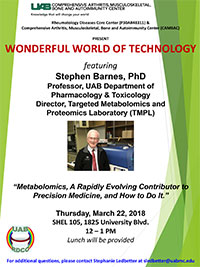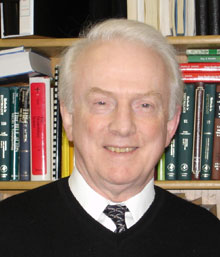Barnes elevated to Distinguished ProfessorUAB Reporter The University of Alabama System Board of Trustees awarded the rank of Distinguished Professor to five faculty during its meeting June 8. 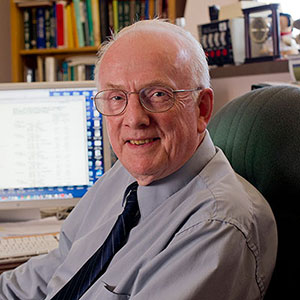 Stephen Barnes, Ph.D., was named Distinguished Professor of Pharmacology and Toxicology in the School of Medicine. Barnes came to UAB in 1977 as a mathematical gastroenterology fellow through the National Library of Medicine and joined the faculty in 1979 as an assistant professor. Now, in addition to his position in the Department of Pharmacology and Toxicology, Barnes is a senior scientist at UAB’s Center for Free Radical Biology, Nutrition Obesity Research Center, Center for Bone and Joint Disease and Nephrology Research and Training Center and he has dual appointments in the departments of Environmental Health Sciences, Genetics and Vision Sciences. Barnes has published more than 300 peer-reviewed journal articles, reviews and book chapters and has delivered lectures at institutions such as Vanderbilt University, Johns Hopkins University and the University of Durham in in Durham, England. In 2012, Barnes was named UAB’s Distinguished Faculty Lecturer. He also is a member of the International Science Advisory Panel at Imperial College London’s National Phenome Center. |
UAB School of Engineering and Medicine
|
Teaching metabolomics: a UAB outreach to researchers in sub-Saharan Africaby Jeff Hansen  For the last 10 weeks, Stephen Barnes, Ph.D., University of Alabama at Birmingham, has taught a group of master’s degree students at a university in the land-locked African nation of Mali. His outreach — via two hours of video conferencing each day and a lot of class material preparation — came at the request of the National Institute of Allergy and Infectious Diseases, to help NIAID create a cadre of bioinformatics researchers at one of the ground zeros for the deadly infectious disease malaria. |
UAB Tissue Imaging Mass Spectrometry detects early lipid changes in acute kidney injuryby Jeff Hansen 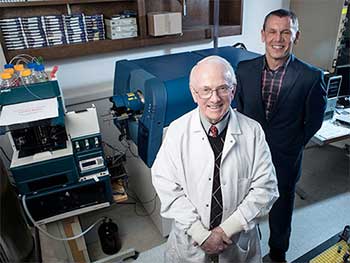 University of Alabama at Birmingham researchers have made a microscopic snapshot of the early renal lipid changes in acute kidney injury, using a laser-scanning method called MALDI tissue imaging to localize the changes. These disease-model results, recently published in American Journal of Physiology’s Renal Physiology, show an example of the power of MALDI tissue imaging. MALDI tissue imaging is now available at UAB, and it will be able to aid basic and clinical biomedical research across the campus, said corresponding author Janusz Kabarowski, Ph.D., associate professor of microbiology. |
Interdisciplinary UAB researchers collaborate to establish new imaging methodby Jim Bakken 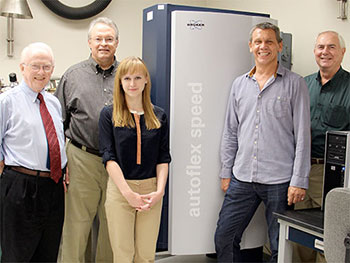 An interdisciplinary collaboration at the University of Alabama at Birmingham recently established a research method that has expanded the institution’s already robust capacity for discovery, addressing a need that will aid in critical initiatives addressing a variety of diseases including cancer, chronic inflammatory autoimmune diseases and age-related degenerative diseases. The matrix-assisted laser desorption/ionization imaging mass spectrometry, or MALDI-IMS, method is a powerful tool for investigating the distribution of molecules within biological systems through the direct analysis of thin tissue sections. |
Barnes selected 2012 UAB Distinguished Faculty LecturerSeptember 17, 2012 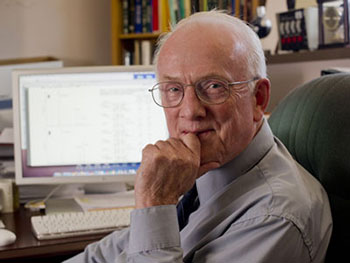 Stephen Barnes, Ph.D., a London native, still remembers how tough times were in post-World War II England. The fighting had devastated the country’s economy, and because resources were not available to expand food production and imports, rationing was common. “We had rationing of things like sugar and butter until I was 10 years old,” says Barnes, a UAB professor of Pharmacology & Toxicology. “That was the world we knew.” Children like Barnes were expected to get an education and make money to help get the country back on track. Barnes figured that, like many of England’s youth, he would wind up in industry. But his applied chemistry degree and industrial training instead steered him into the area of research, where he eventually worked under the tutelage of Nobel Laureate Sir Ernst Chain, the co-discoverer of penicillin. There he began using a form of metabolomics, now very popular in modern biomedical research. |
UAB professor attains high honor in nutrition worldby Jim Bakken 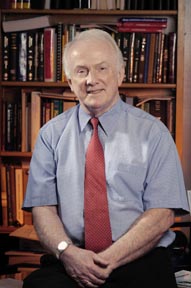 Stephen Barnes, Ph.D., professor of pharmacology and toxicology in the UAB School of Medicine, has been elected as a member of the American Society for Nutrition’s Fellows Class of 2012. Induction into this program is the highest honor the ASN bestows to recognize scientists who have had distinguished careers in the field of nutrition and are age 65 or older. Barnes, who holds several additional appointments throughout the UAB campus, was nominated for this honor by the UAB Nutrition and Obesity Research Center, where he serves as senior scientist. Fellows will be recognized during the ASN Awards Ceremony on Sunday, April 22, 2012. |


